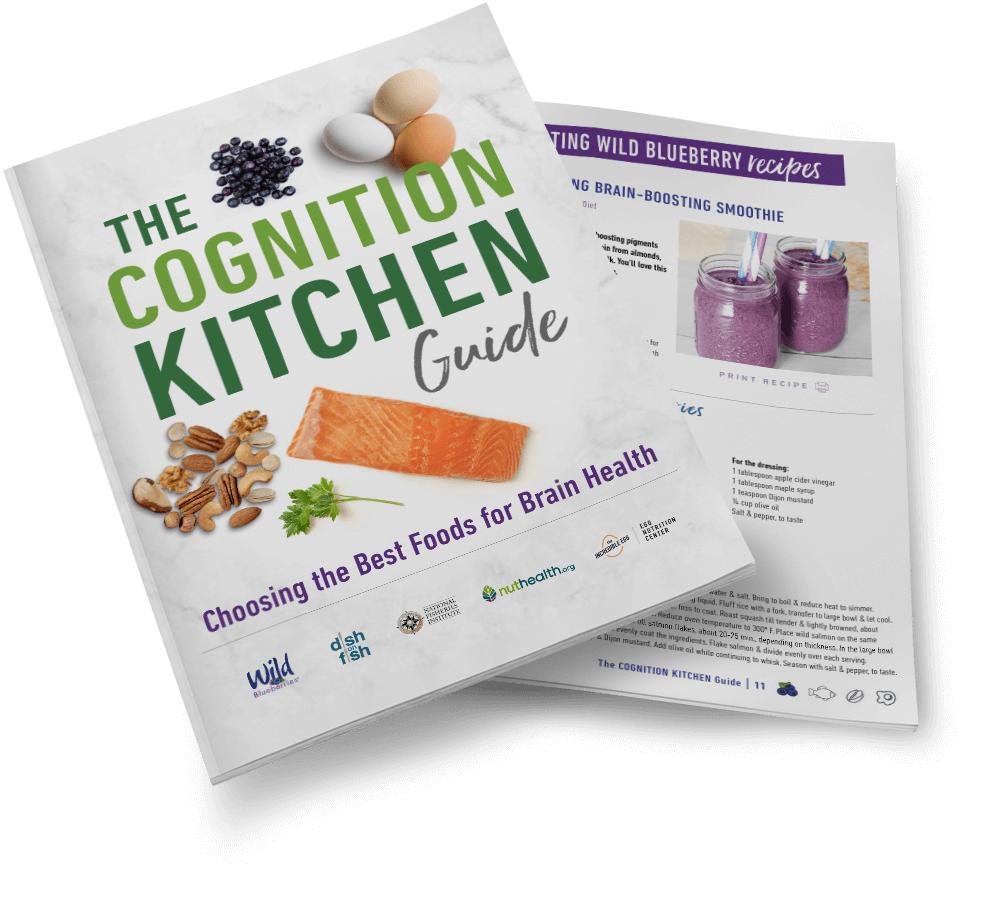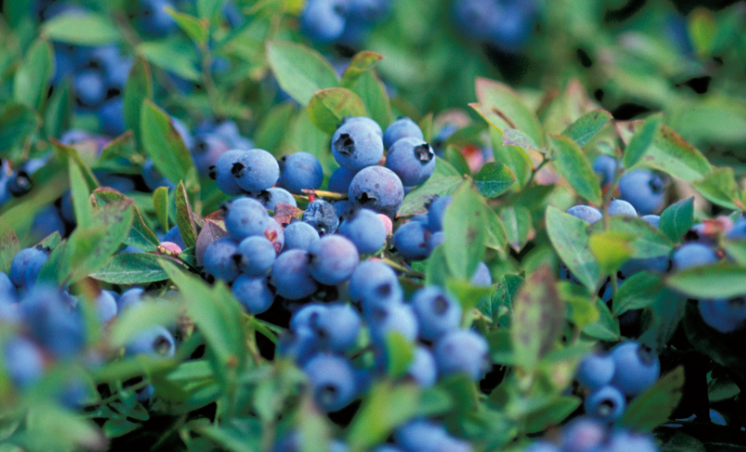Wild Blueberries and the Aging Brain
People often joke about becoming increasingly forgetful with age. Fortunately, mild forgetfulness, like not remembering where we put our keys or phone, is a normal part of aging.1
There are lots of factors involved in brain health. Some factors, such as our genetics or injuries, are beyond our control. But our lifestyles are where we can make an impact on our risk for dementia and neurodegenerative diseases.
Research shows that a lifestyle that includes eating a healthy diet is a primary way to make positive differences in both our cognitive and physical health as we age.

Brain and cognitive changes related to aging—how is diet involved?
As we age, our brains change structurally and functionally. For example, certain parts of the brain shrink, healthy brain cells may start to fail and communication between neurons in the brain may not work as well.2
Even among healthy older adults, these changes can impact mental function, making it harder to remember names or words for common things.
There is a large (and growing) body of evidence that supports the relationship between diet and cognitive function.3 Population studies indicate that consuming a varied diet rich in foods like fruits, vegetables, fish, and whole grains is associated with better cognitive function (less cognitive decline with age).4
What’s more, it’s known that nutrition-related chronic diseases such as Type 2 diabetes and cardiovascular disease, as well as obesity and obesity-related hypertension are associated with cognitive decline.3 That means that modifying your diet to reduce your risk of Type 2 diabetes and cardiovascular disease, will also likely be helpful to brain health.
Changing one’s lifestyle to protect and improve brain health should ideally start early in life. However, there is certainly evidence to suggest that improving one’s diet (as well as modifying other lifestyle factors) in older age is still valuable and worthwhile to the brain.5
What are the benefits of wild blueberries for the aging brain?
Regular blueberry and wild blueberry consumption throughout all stages of life supports our brains in various ways, but studies show that there are brain-boosting benefits tied specifically to conditions found in older people, including:
- Lower risk of Alzheimer’s disease and related dementias was associated with a greater intake of anthocyanin flavonoids in a study population of 2,800 people who were tracked over about 20 years in a recently published study.6 (For more on anthocyanins read What on Earth is an Anthocyanin?)
- Slower rate of cognitive decline: A prospective analysis of 16,000 women in the Nurse’s Health Study found that a higher intake of blueberries and strawberries was tied to slower rates of cognitive decline in older adults equal to about a 2.5-year delay in onset.7
- Improved neural activation: A 4-month study of men and women over age 68 who had mild cognitive impairment, showed that those receiving daily blueberry supplements had enhanced brain activity during a memory task, which was detected using functional MRI (magnetic resonance imaging).8
- Better memory performance: A preliminary study of older adults with mild memory impairment showed improved performance on tests of word recall after drinking wild blueberry juice daily for 12 weeks. (The same study also indicated some benefits to mood.)9
What is dementia?
Our brains are extremely complex, so it’s fitting that maintaining and protecting brain health is also complex and influenced by many factors. When it comes to cognitive decline, the most important factor is age. However, dementia in old age is not a foregone conclusion.
Dementia is a loss of cognitive functioning to the extent that daily activities are affected and quality of life is compromised.10 While memory loss is part of dementia, the condition may also include:
- Difficulty thinking and reasoning
- Problems with paying attention or learning
- Personality problems
- Problems with language skills and visual perception
There are several types of dementia, and the conditions can range from mild to severe. Research indicates that many older people with dementia may have multiple types at once, a condition called mixed dementia. 11
Vascular dementia, the second most common type of dementia (after Alzheimer’s disease), is caused by damage to the brain due to impaired blood flow. Diabetes, high blood pressure, high cholesterol, and smoking raise the risk of developing vascular dementia.12
Can wild blueberries help dementia?
Dementia cannot be cured. However, consuming a healthy diet can modify one’s risk for dementia. An international study conducted with nearly 28,000 adults suggests that people who eat higher-quality, more nutrient-rich diets tend to have a lower risk of cognitive decline as they age. In general, a nutrient-rich diet (also referred to as a nutrient-dense diet) is one that includes a variety of whole plant-based foods such as fruits, vegetables, nuts and whole grains as well as lean proteins, healthy fats.13
In addition, certain dietary patterns (such as those outlined in the MIND diet) and even specific foods, including wild blueberries, are associated with a delay in age-related cognitive decline.14
A number of studies have been conducted where participants were elderly adults who were already experiencing some level of cognitive impairment. In these studies, supplementing the diet with blueberries or wild blueberries improved participant performance on cognitive tests related to memory as well as executive function (the ability of the brain to manage complex tasks related planning, decision making, organizing and paying attention).15
Blueberry benefits have been investigated clinically in both short-term and long-term human research studies, as well as in numerous preclinical studies, leading researchers to believe there are multiple mechanisms of beneficial action. While these mechanisms are still being investigated, it appears that blueberries and wild blueberries confer anti-inflammatory effects in the body, which are particularly important for the brain during aging. Also blueberry components like anthocyanins may have beneficial effects on blood vessels and membrane function, which in turn benefit the delivery of oxygen and glucose to the brain and support neuron signaling processes in the brain. Together, these actions lead to improved metabolic function.15
Blueberries and Alzheimer’s disease
Alzheimer’s disease accounts for 60%-80% of all dementia cases, according to the Alzheimer’s Association.16 It’s a disease that forms over many years and is influenced by factors such as family genetics, environment, and lifestyle. A healthy diet, exercise, social connections and mentally stimulating hobbies and activities have all been associated with maintaining good health as we age. These same factors may also play a role in reducing the risk of dementia and Alzheimer’s disease.17
The condition known as mild cognitive impairment (MCI) may precede the development of dementia and Alzheimer’s disease.18 In studies conducted with people who had MCI, supplementing the diet with blueberry powder led to better performance on memory tests as well as tasks which required executive function.15 Executive function is related to the brain’s ability to manage the complex tasks of everyday living.
Emerging research suggests the risk for Alzheimer’s disease (and other dementias) is associated with conditions related to cardiovascular disease and metabolic health, including obesity and insulin resistance. Research has documented that anthocyanins found in wild blueberries can positively impact all of these conditions.15
Can wild blueberries help Alzheimer’s disease?
A newly published population analysis reported on the risk of Alzheimer’s disease and related dementias in relation to fruit and vegetable flavonoid intake, in approximately 2,800 people over the span of about 20 years. Among five categories of food flavonoids for which daily intake was examined, the intake of anthocyanins showed the greatest positive impact on reducing the risk of Alzheimer’s disease and related dementias.6
Wild blueberries are especially rich in the flavonoid called anthocyanins, and have 33% more anthocyanins than regular blueberries. Getting into a regular habit of including wild blueberries in your diet is an easy (and tasty) way to help reduce your risk of dementias and Alzheimer’s disease. Try sprinkling them over salads, oatmeal and using them in smoothies. anywhere else you can sprinkle them to reduce your risk of various dementias, including Alzheimer’s disease.
References:
- National Institute on Aging (2020). Memory, Forgetfulness, and Aging: What’s Normal and What’s Not? https://www.nia.nih.gov/health/memory-forgetfulness-and-aging-whats-normal-and-whats-not
- National Institute on Aging (2020). How the Aging Brain Affects Thinking. https://www.nia.nih.gov/health/how-aging-brain-affects-thinking
- Dominguez, L. J., & Barbagallo, M. (2018). Nutritional prevention of cognitive decline and dementia. Acta bio-medica : Atenei Parmensis, 89(2), 276–290. https://doi.org/10.23750/abm.v89i2.7401
- Heidi J. Wengreen, Chailyn Neilson, Ron Munger, Chris Corcoran, Diet Quality Is Associated with Better Cognitive Test Performance among Aging Men and Women, The Journal of Nutrition, Volume 139, Issue 10, October 2009, Pages 1944–1949, https://doi.org/10.3945/jn.109.106427
- Klimova B, Dziuba S, Cierniak-Emerych A. The Effect of Healthy Diet on Cognitive Performance Among Healthy Seniors – A Mini Review. Front Hum Neurosci. 2020 Aug 11;14:325. doi: 10.3389/fnhum.2020.00325. PMID: 32848680; PMCID: PMC7433394. https://pubmed.ncbi.nlm.nih.gov/32848680/
- Shishtar, E., Rogers, G. T., Blumberg, J. B., Au, R., & Jacques, P. F. (2020). Long-term dietary flavonoid intake and risk of Alzheimer disease and related dementias in the Framingham Offspring Cohort. The American journal of clinical nutrition, 112(2), 343–353. https://doi.org/10.1093/ajcn/nqaa079
- Devore, E.E., Kang, J.H., Breteler, M.M.B. and Grodstein, F. (2012), Dietary intakes of berries and flavonoids in relation to cognitive decline. Ann Neurol., 72: 135-143. https://doi.org/10.1002/ana.23594
https://onlinelibrary.wiley.com/doi/full/10.1002/ana.23594 - Boespflug, E.L et al, Enhanced neural activation with blueberry supplementation in mild cognitive impairment, Nutritional Nueroscience 2018; 21:4. https://www.tandfonline.com/doi/full/10.1080/1028415X.2017.1287833
- Krikorian, R., et al, Blueberry supplementation improves memory in older adults, J Agric Food Chem 2010; 58:7 https://www.ncbi.nlm.nih.gov/pmc/articles/PMC2850944/
- National Institute on Aging (2017). What is Dementia? Symptoms, Types and Diagnosis. https://www.nia.nih.gov/health/what-dementia-symptoms-types-and-diagnosis
- National Institute on Aging (2017). What is Mixed Dementia? Causes and Diagnosis. https://www.nia.nih.gov/health/what-mixed-dementia-causes-and-diagnosis
- Mayo Clinic (2018). Vascular Dementia. https://www.mayoclinic.org/diseases-conditions/vascular-dementia/symptoms-causes/syc-20378793
- Smyth A, Dehghan M, O’Donnell M, et al. Healthy eating and reduced risk of cognitive decline: A cohort from 40 countries. Neurology. 2015;84(22):2258-2265. doi:10.1212/WNL.0000000000001638 https://www.ncbi.nlm.nih.gov/pmc/articles/PMC4456656/
- Morris M. C. (2016). Nutrition and risk of dementia: overview and methodological issues. Ann. N. Y. Acad. Sci. 1367 31–37. https://www.ncbi.nlm.nih.gov/pmc/articles/PMC4849169/
- Wilhelmina Kalt, Aedin Cassidy, Luke R Howard, Robert Krikorian, April J Stull, Francois Tremblay, Raul Zamora-Ros, Recent Research on the Health Benefits of Blueberries and Their Anthocyanins, Advances in Nutrition, Volume 11, Issue 2, March 2020. https://doi.org/10.1093/advances/nmz065
- Alzheimer’s Association. What is Alzheimer’s Disease? https://www.alz.org/alzheimers-dementia/what-is-alzheimers
- National Institute on Aging (2019). Alzheimer’s Disease Fact Sheet. https://www.nia.nih.gov/health/alzheimers-disease-fact-sheet#causes
- Mayo Clinic (2020). Mild Cognitive Impairment. https://www.mayoclinic.org/diseases-conditions/mild-cognitive-impairment/symptoms-causes/syc-20354578
Get Great Recipes & More Each Month!
Sign up for occasional emails with recipes, health and nutrition tips, and more.

More About Brain Health
Blu-Flow study spotlights wild blueberries’ support of cardiovascular and cognitive function
New Research Study Indicates Wild Blueberries Improve Brain’s Processing Speed
A Healthy Heart Month “Two-fer” From Wild Blueberries
The Seven Wild Ways to a Healthy Brain in 2024
The Wild Difference: Celebrating Wild Foods Day All Month Long

DOWNLOAD THE COGNITION KITCHEN GUIDE
A free resource to help you and your family start eating for brain health today. Find recipes, a grocery list, easy-to-understand health research, and more.



